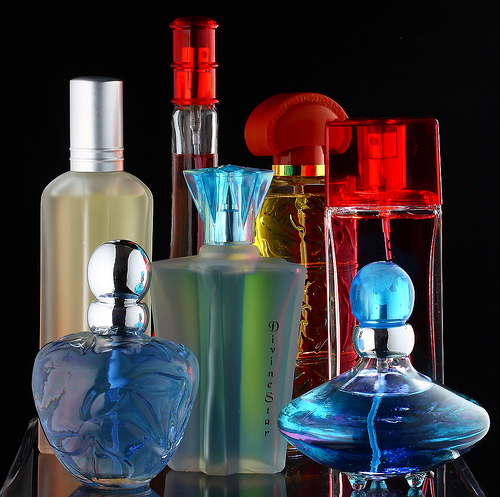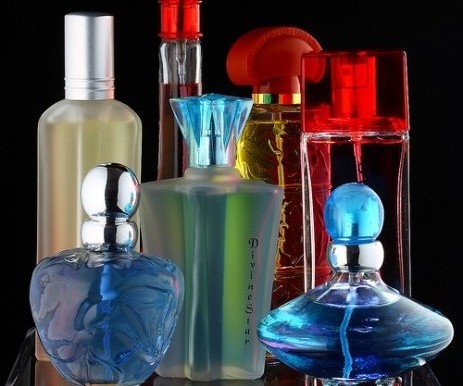Send your question to Umbra!
Q. Dear Umbra,
I received a beautiful, vintage perfume bottle w/ the pump and a tassle attached as a going away gift. I was wondering if there is any way I can put my Clinique perfume from the regular spray bottle into this gift. Thanks!
Kia
Denver, CO
 Whiff you or without you? Best to go without. A. Dearest Kia,
Whiff you or without you? Best to go without. A. Dearest Kia,
Ask and ye shall receive — more than you bargained for, my friend! But please don’t shoot the messenger — especially not with that perfume of yours.
I wouldn’t be doing my job as a green advice maven if I didn’t suggest that you look for something else to fill that pretty gift bottle, Kia. A quick trip to the Environmental Working Group’s Skin Deep Cosmetic Safety Database shows that Clinique’s Happy, which I’m assuming is the perfume you use, has the potential to make you anything but. It gets an 8 (out of 10) rating, which puts it in the high hazard category for personal care products. That means “Happy” includes chemicals linked to cancer, neurotoxicity, developmental and reproductive toxicity, allergies, skin, eye, and lung irritation, and more! But before you get too upset, Kia, be assured that your perfume isn’t the only one that stinks.
Alexandra Spunt and Siobhan O’Connor, authors of No More Dirty Looks, discovered some disquieting things while researching fragrance for their book. “There’s no way for consumers to verify what’s in [perfume or cologne],” said Alexandra. “Thanks to business-friendly trade secret laws, the fragrance industry is not required to reveal ingredients.” This labeling loophole allows perfume manufacturers to pack a whole array of undisclosed, and potentially dangerous ingredients into their products.
In a May 20010 report from the Campaign for Safe Cosmetics, researchers found that “top-selling fragrance products contain multiple allergens and hormone-disrupting chemicals linked to asthma attacks, headaches, and serious long-term effects such as infertility, thyroid problems, and increased risk of cancer.”
This problem goes beyond your perfume bottle, Kia. “It’s not just perfume,” Alexandra noted. “It’s your body wash, your shampoo, your moisturizer … Even makeup contains fragrance sometimes.” In fact, foul ingredients in personal products threaten men too. Old Spice investigated closely is more like Scary Spice. And the State of California recently fined AXE Body Spray for contributing to air pollution.
Which brings up another important point: fragrant products can contribute to indoor air pollution. In addition to the synthetic chemicals that create the fragrance, additives in these products that prolong shelf life, protect against the sun, and stabilize the scent are often composed of Volatile Organic Compounds, which can lead to indoor air pollution, leaving free radicals and ozone in enclosed spaces. If you haven’t seen it already, The Story of Cosmetics video is a great primer on this issue.
You’ve probably already guessed that what’s bad for your body is also bad for the planet. Much like traces of Prozac found in drinking water, the chemicals in fragrance make their way into ecosystems and the food chain. Chanel was never meant to spice shellfish.
Now, finally, to answer your question about the gift bottle, Kia! If you still want to transfer your Clinique Happy, here are some expert resources to help you. All you have to do is remove the top of your Clinique perfume bottle, open the gift perfume atomizer, and then fill it.
If, on the other hand, you’re having second thoughts and perhaps considering filling that new perfume bottle with a favorite essential oil instead, be mindful. According to Olga Naidenko, senior scientist at the Environmental Working Group, essential oils — or “natural fragrances” — are not necessarily safer than synthetics. “Essential oils are very concentrated extracts of biological molecules,” she explains. And not all those biological molecules are friendly. Case in point, poison ivy. It is “natural,” but you wouldn’t want its oils anywhere near your skin. For more on using essential oils as perfume, refer to the Environmental Working Group’s Skin Deep database.
If what you’ve learned here has got you fumed about perfume, a sensible thing to do, Kia, is to use your atomizer to spread a message of support for the Safe Cosmetics Act of 2010. The Safe Cosmetics Act, if passed, will require fragrance manufacturers to provide labels that list all the components of fragrances and preservatives, as well as information on any adverse health effects. The act would also ban the use of carcinogens, and developmental and reproductive toxins.
And those are my two scents. Smell you later, Kia!
Nosily,
Umbra
P.S. Here are some more fragrant links you may want to sniff out:
- My video advice on waking up to what’s in your make up.
- A list of common ingredients found in fragrances and their health effects.
- The Fragranced Products Information Network.
- More tips on greening your perfume or cologne.
- Learn more about fragrance from the Campaign for Safe Cosmetics.



